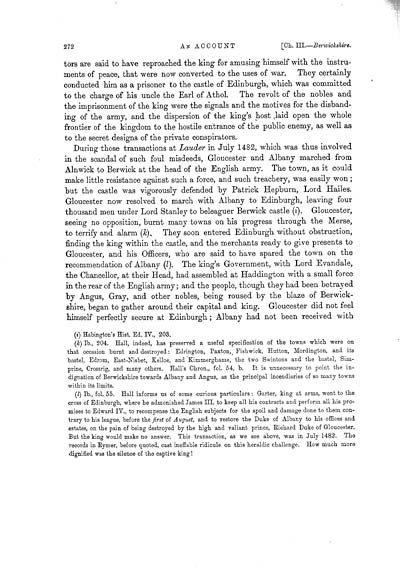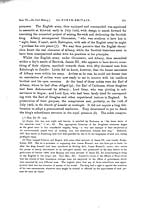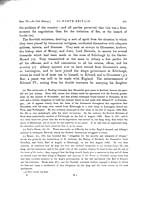Volume 3
(284) Page 272
Download files
Individual page:
Thumbnail gallery: Grid view | List view

272 tors are said to Lave reproached the king for amusing himself with the instru- ments of peace, that were now converted to the uses of war. They certainly conducted him as a prisoner to the castle of Edinburgh, which was committed to the charge of his uncle the Earl of Athol. The revolt of the nobles and the imprisonment of the king were the signals and the motives for the disband- ing of the army, and the dispersion of the king's host laid open the whole frontier of the kingdom to the hostile entrance of the public enemy, as well as to the secret designs of the private conspirators. During those transactions at Lauder in July 1482, which was thus involved in the scandal of such foul misdeeds, Gloucester and Albany marched from Alnwick to Berwick at the head of the English army. The town, as it could make little resistance against such a force, and such treachery, was easily won ; but the castle was vigorously defended by Patrick Hepburn, Lord Hailes. Gloucester now resolved to march with Albany to Edinburgh, leaving four thousand men under Lord Stanley to beleaguer Berwick castle (i). Gloucester, seeing no opposition, burnt many towns on his progress through the Merse, to terrify and alarm (k). They soon entered Edinburgh without obstruction, finding the king within the castle, and the merchants ready to give presents to Gloucester, and his Officers, who are said to have spared the town on the recommendation of Albany (l). The king's Government, with Lord Evandale, the Chancellor, at their Head, had assembled at Haddington with a small force in the rear of the English army; and the people, though they had been betrayed by Angus, Gray, and other nobles, being roused by the blaze of Berwick- shire, began to gather around their capital and king. Gloucester did not feel himself perfectly secure at Edinburgh; Albany had not been received with (i) Habington's Hist. Ed. IV., 203. (k) Ib., 204. Hall, indeed, has preserved a useful specification of the towns which were on that occasion burnt and destroyed: Edrington, Paxton, Fishwick, Hutton, Mordington, and its bastel, Edrom, East-Nisbet, Kelloe, and Kimmerghame, the two Swintons and the bastel, Sina- prine, Crossrig, and many others. Hall's Chron., fol. 54, b. It is unnecessary to point the in- dignation of Berwickshire towards Albany and Angus, as the principal incendiaries of so many towns within its limits. (l) Ib., fol. 55. Hall informs us of some curious particulars : Garter, king at arms, went to the cross of Edinburgh, where he admonished James III. to keep all his contracts and perform, all his pro- mises to Edward IV., to recompense the English subjects for the spoil and damage done to them con- trary to his league, before the first of August, and to restore the Duke of Albany to his offices and estates, on the pain of being destroyed by the high and valiant prince, Richard Duke of Gloucester. But the king would make no answer. This transaction, as we see above, was in July 1482. The records in Rymer, before quoted, cast ineffable ridicule on this heraldic challenge. How much more dignified was the silence of the captive king !
Set display mode to:
![]() Universal Viewer |
Universal Viewer | ![]() Mirador |
Large image | Transcription
Mirador |
Large image | Transcription
Images and transcriptions on this page, including medium image downloads, may be used under the Creative Commons Attribution 4.0 International Licence unless otherwise stated. ![]()
| Caledonia, or, An account, historical and topographic of North Britain from the most ancient to the present times > Volume 3 > (284) Page 272 |
|---|
| Permanent URL | https://digital.nls.uk/74528642 |
|---|---|
| Description | Vol. III. |
|---|---|
| Attribution and copyright: |
|

